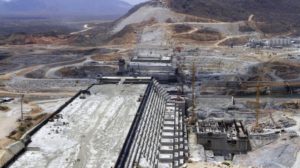- Stay Connected
Egypt may be ‘wasting time’ in GERD talks with Ethiopia: professor

Renewed talks between Egypt and Ethiopia on the Grand Ethiopian Renaissance Dam (GERD) may be going in the wrong direction, as one professor at Cairo University believes.
President Abdel Fattah Al-Sisi met with Ethiopian prime minister Hailemariam Desalegn on the sidelines of the 27th African Union summit in Kigali, Rwanda.
Presidency spokesperson, Alaa Youssef, said both parties were looking forward to the start of the international consulting desk’s studies regarding the GERD, in order to reach a common ground between Egypt’s concerns over a potential decrease in Nile water share and Ethiopia’s developmental endeavours.
Another tripartite summit is expected to be held soon between Egypt, Sudan, and Ethiopia to discuss the procedures of flooding water in the dam for the first time.
The GERD, of which 70% has been completed, has strained relations between Ethiopia and Egypt since construction began in 2011, with relations reaching their lowest point in 2013.
n early June, Egypt’s foreign ministry said it is finalising the deals with the consulting agencies to assess the impact of the GERD. Last December, Egypt, Ethiopia, and Sudan signed the Khartoum Document, addressing ways to enforce and execute the declaration of principles.
Nader Noor El-Din, water resources professor at Cairo University, warned against the direction in which Egypt is heading in this file.
“Those consulting studies are completely useless,” he told Daily News Egypt. “The studies are expected to take 17 months as an average while the GERD completion is scheduled for October 2017, which is 12 months away from now. The results of these studies are also non-binding.”
Noor El-Din suggested that Egypt should resort to the international court and the United Nations Security Council to prove the potential risks of the construction on Egypt’s access to water. Those risks are inevitable, according to him. “If this potential harm was proven later on, Egypt would not be able to take this legal path,” he said.
More practical actions should be taken, Noor El-Din further noted. “Egypt should start negotiating for its water share, otherwise it will be wasting its rights,” referring to the expedite progress in the GERD construction.
